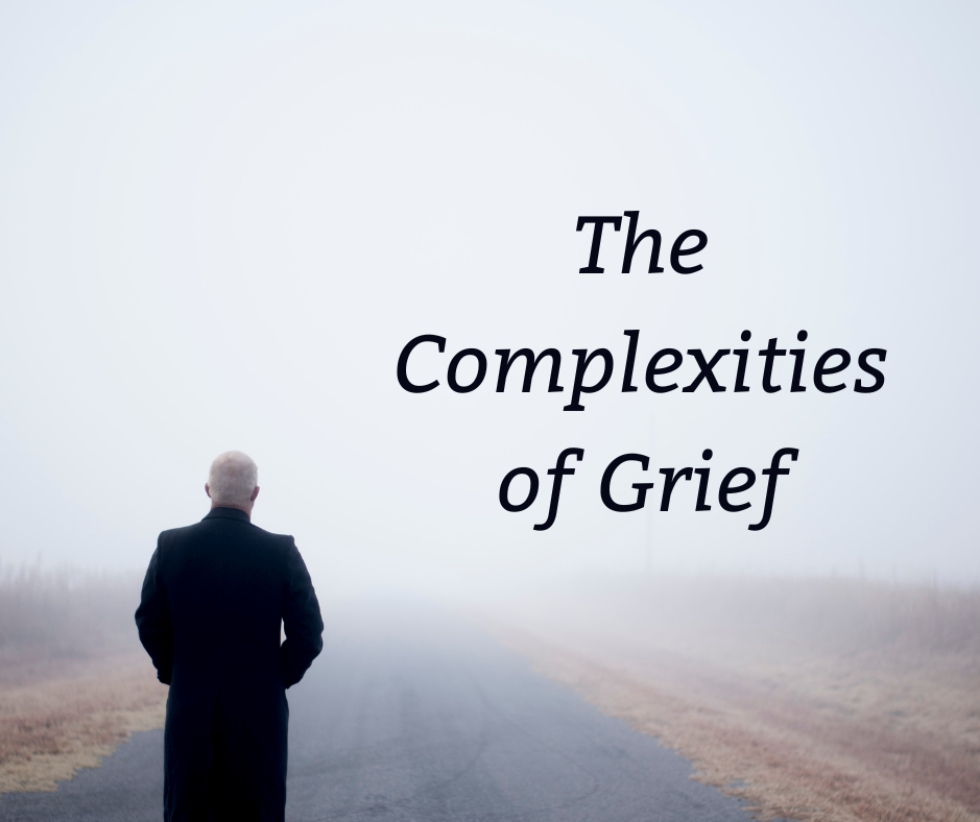
Grief can be extremely complex. It can arrive at different moments of life such as the death of a loved one, an estranged child or family member, or a major life change such as moving to a care facility. I've learned throughout my life that grief is very personal and each person endures it differently.
Renowned author, C.S. Lewis of The Chronicles of Narnia fame and other influential works, experienced profound grief after the death of his wife, Joy Davidman, in 1960. His journey through grief is depicted in his book, A Grief Observed, which provides a raw and honest account of his emotions and struggles during that time.
Lewis wrote about the intense sadness, anger, and confusion he faced, openly expressing his grief. Through the pages of his book, he takes readers on a deeply personal journey through the complexities of grief, providing a poignant exploration of the experience of loss.
Lewis starts out the book stating, "No one ever told me that grief felt so like fear."
This quote encapsulates the intense emotional knowledge of grief. Lewis compares the overwhelming feelings to the familiar sensation of fear, highlighting the depth of pain and uncertainty that grief can bring. It speaks to the profound impact of loss and how it can permeate one's emotions, often leaving a sense of vulnerability and unease.
How does the saying go? "Character is revealed in the darkest times?" In chapter 3, Lewis reflects on how his grief has exposed the fragility of his faith and the illusions of strength he held. "God has not been trying an experiment on my faith or love in order to find out their quality. He knew it already. It was I who didn't. In this trial He makes us occupy the dock, the witness box, and the bench all at once. He always knew that my temple was a house of cards. His only way of making me realize the fact was to knock it down." Here Lewis acknowledges that God, in His omniscience, was aware of his weaknesses all along. The experience of grief served as a means of revealing the true state of his faith, leading to a process of self-discovery and humbling before God.
Lewis wraps up his reflections by stating in the final chapter, "The resurrection was already the consolation even before grief came." He acknowledges the consoling power of the resurrection of Christ, even in the face of deep sorrow. This highlights his belief in the hope and eternal life found in Christ, providing a perspective of comfort and assurance during his grief.
Throughout A Grief Observed, Lewis intertwines his personal experiences of grief with his Christian worldview. His reflections touch on various aspects of faith, including the presence of God, the testing and refining of faith, and the hope found in Christ's resurrection. These Christian tie-ins offer glimpses into Lewis' profound grappling with grief within the context of his beliefs.
In the final days of my father's fight with cancer, I recall sitting in the hospital room with him and my parent's pastor who was a faithful shepherd. I was moved by the pastor's honest expression of death and dying. While death is a natural consequence of the fallen human condition and the result of sin entering the world, we know that death is not a part of God's original plan for humanity.
Thanks be to God we hold a firm belief in the hope and victory over death through Jesus Christ. We have hope through His resurrection, and the promise of eternal life for all who have faith in Him. Therefore, we can view death as a transition rather than an end, as we are united with Christ in His victory over sin and death.
Martin Luther's hymn, "A Mighty Fortress Is Our God," resonates this same theme in verse four.
"The Word they still shall let remain
Nor any thanks have for it;
He's by our side upon the plain
With His good gifts and Spirit.
And take they our life,
Goods, fame, child, and wife,
Though these all be gone,
Our vict'ry has been won;
The Kingdom ours remaineth."
This verse reassures us that even in the midst of grief and tribulation we need not fear. The verse affirms that God's truth will triumph, providing solace and hope in the face of loss. While the world may be filled with devils and threats, find courage knowing that the power of darkness is limited and ultimately doomed. We draw strength from God's Word, the presence of the Holy Spirit, and His gifts bestowed upon us. Even in the deepest sorrow and loss, we can find reassurance in the ultimate victory through Christ's resurrection and thus our own, bringing comfort and hope in times of mourning.
The pastor's message to us on that day in my dad's hospital room allowed me to embrace the rawness of grief as I was experiencing the depth of sorrow, anger, confusion, and complex emotions. It's important to seek out the support of those around you such as your pastor, family members, friends, or your church community. Spend time with God in prayer and in His Word. The gift of God's mercy and grace is our source of peace and yes, even joy, in moments of grief. Seeking support from your pastor or a good Christian counselor can be valuable in navigating complexities of grief.
The various names of God in the Bible can be powerful in conveying who God is and His role in our lives. Some significant names include the Good Shepherd (John 10:11), King of Kings and Lord of Lords (Revelation 19:16), and The Light of the World (John 8:12). Do you have a favorite name for God? One of my favorites is Ancient of Days as found in Daniel 7:9, "As I looked, thrones were placed, and the Ancient of Days took his seat; his clothing was white as snow, and the hair of his head like pure wool; his throne was fiery flames; its wheels were burning fire." The title "Ancient of Days" as mentioned in the book of Daniel is used to describe God's eternal and timeless nature. It emphasizes His authority, wisdom, and everlasting existence. The imagery in this verse depicts a majestic and awe-inspiring vision of God seated on His throne, representing His sovereignty and dominion over all creation.
Worship Anew comes alongside and ministers to people every day who are like Lewis, seeking consolation in the resurrection of Christ, recognizing the comfort and hope it offers even in the midst of sorrow. This vital work would not be possible without your prayers and faithful support. Despite the challenges we face in this life, God's mercy and grace are our source of comfort and strength. Though the journey may be challenging, we can find strength as we lean on our loving Savior and hold fast to the promise of eternal life through Christ's resurrection. May His presence sustain us and bring healing to our wounded hearts.
Matthew F. Leighty
Executive Director


